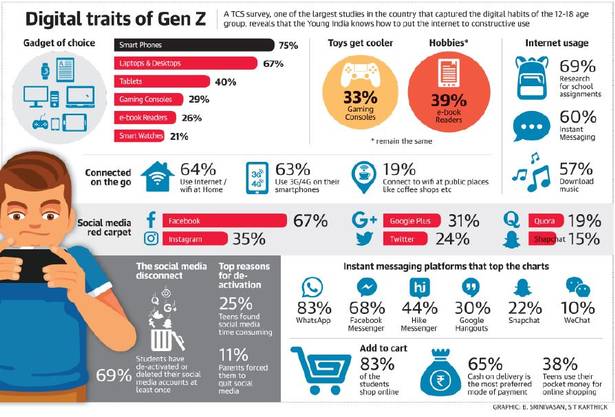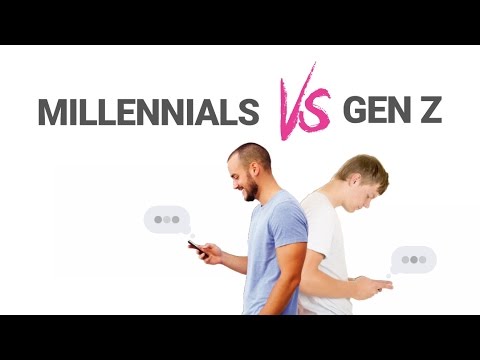108 top insights on Generation X, Y, Z and Alpha
Are you looking to know more about Generation X, Y, Z and Alpha? Read on to discover 108 insights on Generation X, Y, Z and Alpha on several criteria like family values, career, consuming habits, communication, aspirations, fears and challenges, social interactions and psychological profile.
GENERATION X or Gen Xers (1965 to 1980)
Family values – Gex X values work-life balance
1.Gen Xers are family-oriented, financially responsible and self-reliant.
2. They value a healthy balance between time spent at work and personal time and want to pursue their own aspirations.
3. They enjoy leveraging the power of new tech in their adult years, but they also remember what the world was like before the rise of the internet and the digital revolution. In that sense, Gen Xers are the generation who transitioned from analogue to digital.
4. People born in the late 1970s – early 1980s are the latchkey generation or the MTV generation because they learned to entertain themselves in the hours between coming home from school and parents coming home from work.
5. Growing up in the 80s, with the largest divorce rate in history, a big number of the Gen X cohort grew up with a divorced parent.
6. While Gen Xers may not have had a great relationship with their parents growing up, now, in their adult years, they see their parents as older friends.
7. As parents, Gen Xers vowed to avoid making the same mistakes as their parents and learned to do better in the relationship with their children.
8. Gen Xers marry later in life, once their careers and finances are more established and stable. They divorce less (36%) than their parents (48%) but more than Millennials (26%) (source).
Education – Gen Xers are eager to learn
9. The members of Gen X are often noted as prioritizing self-directed educational opportunities and programs that enable them to learn on their own schedule.
10. They have benefited from traditional education by attending in-classroom lessons and writing on the blackboard. The internet and the digital revolution led to the rise of new jobs requiring new skills.
11. Gen Xers are the first generation to acknowledge, sometimes with sadness, that their formal education is no longer enough. They are the first to embody the growth mindset and live out the adapt or die concept.
12. Xers want to keep moving forward by developing a wide variety of skills that keep them employable.
13. The members of Gen X are prioritizing continuous learning in the form of microlearning. According to this survey, almost 37% said it was very important that the hiring company provide training to update their skills and/or knowledge.
Career – Gen Xers work to live, not live to work
14. Gen Xers are financially stable, are at their highest-earning years and are on their way to reaching the top of their profession. Making smart decisions for their family’s safety and financial future is very important to them (source).
15. Gen Xers believe that you need to plan your career, or you might not have one. What can Gen Xers offer employers? A wealth of knowledge, experience and stability. What are Gen Xers expecting from employers? Development opportunities and leaders who exemplify the company’s values with their actions.
Consuming habits – Gen Xers are looking for discounts and loyalty programs
16. Gen Xers grew up before Amazon and the online shopping experience. However, they have now fully embraced e-commerce although they still enjoy an in-store shopping trip.
17. They are known to conduct online research at home and then shop in person, while their younger counterparts conduct research on their phones, in the store. They turn to Google to direct their purchasing decisions.
18. They’re also known to be very loyal customers with a high appreciation for value discounts and loyalty programs. They read product reviews, expect great customer service and are moved by nostalgia-based marketing.
19. The preferred social media platform of Gen Xers is Facebook where they connect with family and friends. Although highly tech-reliant, the members of Gen X are considered digitally conversant, but not digitally native.
20. Gen Xers buy products that are unique and high-quality, as opposed to Generation Y and Z who buy based on community and value (source).
Communication – 55% of Gen Xers use WhatsApp
21. Gen X was the first generation to incorporate digital technology in their youth. Generation X prefers receiving and using short, brief messages as opposed to lengthy ones (source).
22. The ability to utilize forms of digital technology enables Generation X to connect with younger people, such as Millennials or Generation Z.
23. They appreciate informal and flexible communications with 55% using WhatsApp.
Aspirations/Fears/Challenges – The average successful startup founder is a Gen Xer
24. The average age of a successful startup founder is 45 per this study, which makes the younger members of Gen X the most entrepreneurial of all generations.
25. Gen Xers fear not being adequately prepared for major leadership roles and not having time for their families and personal lives (source).
26. They fear being overlooked and replaced by Millennials in the workplace. They also fear they are not as prepared for retirement as their parents were. One of their goals is to become debt-free.
Psychological profile – Gen Xers don’t let negative feedback stop them
27. Gen Xers are independent, flexible, self-reliant critical thinkers. They are technologically adept, flexible and highly educated.
28. The members of Gen X are resourceful since they have been accustomed to caring for themselves and younger siblings since before reaching adulthood.
29. They value freedom and responsibility and try to overcome challenges on their own (source).
30. Generation X is more direct than the members of the other generations. They embrace feedback and don’t get hung up on negative feedback like the Millennials.
GENERATION Y or Millennials (1981 to 1995)
Family values – My child is one of my best friends
31. Millennials want different lives than their parents. On average, they have delayed or forgone marriage than previous generations and have been somewhat slower in forming their own households (source).
32. According to this report, when Millennials become parents, they take on a more intimate, less hierarchical role with their children than parents of previous generations. To that end, they want an open, honest dialogue with their children. In fact, nearly 8 out of 10 millennial parents agree that their child is one of their best friends.
33. For 95% of Millennial workers, finding a work/life balance is important.
Education – Skill development is crucial for the Millennial’s career
34. A greater number of Millennials have received a university education than the members of Generation X, meaning they can obtain higher-paid roles earlier in their careers.
35. 93% of Millennials find skill development crucial for their career.
Career – Money, security and time-off
36. Millennials are the largest generation in the modern workforce and are making more money than the workforce as a whole.
37. An increasing number of them are reaching executive and director level and have more cash coming in than ever before (source).
38. The next most successful entrepreneur behind the Gen Xer is the Millennial. Per this report, 84% of Millennials revealed that they are more satisfied as an entrepreneur than when they worked for someone else.
39. When they are not starting their own business, Millennials work full-time. According to stats, 73% of Millennials have full-time jobs. However, employed Millennials still look for getting a little extra money. 28% of employed millennials reported having a side hustle, and 61% of them made extra money on a weekly basis. 75% of Millennials prefer working from home and working remotely.
40. What do Millennials prioritize when looking for a job? Money, security and time-off.
Consuming habits – Millennials desire “experiences over things”
41. Millennial consumers are the largest generation and hold the most spending power – with a projected $1.4 trillion tab (source). Millennial high earners are those raking in at least $100,000 a year.
42. Some of this cohort had saved up to $3,000 a month during lockdown last year and now they are looking to spend big on travel. Millennials comprise the highest rate of luxury bookings (trips costing at least $5,000).
43. The consumption habits of Millennials are driven by their values or morals.
44. According to this survey, the top three goals for Millennials with a financial plan are debt repayment (57%), travel (48%) and increasing the amount they save for retirement (45%).
Social relationships – Millennials believe in changing communities
45. The millennial generation is conscious at all levels.
46. They want to save their money and invest in a socially responsible manner because they believe in changing communities. They are more racially and ethnically diverse, which has helped them support and fight for equality and human rights.
47. Millennials care most about civil rights/racial discrimination, healthcare, education, and employment (source).
Communication – Millennials like infotainment
48. 41% of Millennials prefer electronic communication. They are always on social media communicating and engaging in conversations that resonate with their interest.
49. Millennials appreciate authentic and fast communications with a preference for using text, chat, email and Instagram; they value efficiency and a digital-first approach.
50. Social media platforms are where Millennials receive their news and other important information.
51. Millennials are less likely to trust and show loyalty to companies that sound corporate and generic. They prefer brands that look, act, and sound friendly, cheeky, and personable.
52. Millennials are influenced by infotainment — content that both entertains and informs. If a brand engages with a millennial on a social network, the millennial is 62% more likely to become a loyal customer.
Aspirations/Fears/Challenges – Millennials are looking for purpose and fear failure
53. Millennials want to do something with their life other than just earn a living. They are interested in the problems of the world, like climate change, animal extinction, and GMOs.
54. They want to get involved and find their purpose by being inspired by the change they want to make (source). Six in 10 millennials say that a “sense of purpose” is part of the reason they chose their current employer (source).
55. The Top 3 goals of Millennials according to Statista are owning their own home, financial stability and travelling.
56. Millennials expect to lead a more balanced life than previous generations. Private life and leisure activities are very important to them. They believe that to be good at work, they need to be happy in their life.
57. Their greatest fears related to work-life are getting stuck with no development opportunities (40%), not realizing their career goals (32%) and not finding a job that matches their personality (32%).
Psychological profile – Looking for a healthy lifestyle
58. More Millennials consider mental and physical health an essential expense than did baby boomers and Gen Xers (source)
59. Compared to the previous generation, Millennials focus on larger societal needs rather than individual needs.
60. Travelling the world is the highest priority for 57% of Millennials.
61. Millennials care about experiences (they expect genuine and incredible experiences and want to build lasting memories), values and purpose.
62. Studies show that millennials are leading the way when it comes to developing a healthy lifestyle and making good choices.
GENERATION Z or Gen Zers (1996 to 2009)
Family values – Gen Zers are influencing family decisions
63. Kids and teens today are members of Generation Z or Gen Zers. They grow up in a single-parent or dual-income household. But whether or not they live in a traditional family, parents of Gen Zers have less time. They often rely on their children to help them make purchase decisions.
64. Given the members of Generation Z have 24/7 access to information thanks to social media and a natural inclination to learn and explore, most parents happily delegate product research to their offspring.
65. What decisions does Gen Zers influence? Fast food restaurants and breakfast foods for their families, followed by snack and lunch foods, recreational activities, in-home entertainment and vacation destinations (source).
Education – On track to be the most well-educated generation
66. Members of Generation Z are on track to be the most well-educated generation yet and also more likely to have a college-educated parent than are previous generations of young people.
67. Because of this, they are more likely to be engaged in educational endeavours for a longer period of time than previous generations when they were teens and young adults (source).
68. They are also the first digital natives.
Career – Failure helps Gen Zers learn and grow
69. The most in-demand job that Gen Z job seekers are applying to is software engineer followed by software developer.
70. Gen Zers are aspiring to work in tech — the majority of job applications from Gen Zers were for companies in the tech industry, followed by business services, finance and retail. IBM, Google, Amazon, Microsoft and Deloitte are the top five companies that Gen Z are applying to. As digital natives, the members of Generation Z are drawn to search for jobs at tech companies.
71. What is Generation Z looking for when searching for a tech job? Good work environment, flexible hours, free food and company discount (source)
72. This generation prioritizes job security.
73. One refreshing aspect of Generation Z workers is their attitude about failure. While most other generations view failure as something to avoid, members of Generation Z are energized by failure.
74. According to one study, 80% of Generation Z sees failure as something to embrace on their way to more innovation and learning within a project. In fact, failure helps them learn and grow (source)
75. Gen Z is rapidly becoming known as the most entrepreneurial generation ever, with 62% of Gen Zers indicating they have started—or intend to start—their own business.
Consuming habits – Gen Zers’ purchasing decisions reflect their values and identity
76. They are shrewd consumers. As consumers, Gen Z rely on their tech savvy and extensive social networks to make informed purchasing decisions.
77. Their pragmatism leads them to explore and evaluate a range of options before settling on a product.
78. They also look at their purchasing decisions as an expression of their values and identity. As an example, they are drawn to sustainable products and brands — and are often willing to pay more for them.
79. They value personalized products, and they are drawn to brands who share their point of view on political issues (source).
80. Members of Generation Z spend more money than Millennials and are more than happy to browse in-store instead of online.
81. Material value may hold stronger resonance with Gen Z, as “Gen Z seems to be more drawn to things than the Millennials are, and they are keen to buy apparel and fashion accessories for themselves.”
Social relationships – Video and virtual dating are important to Gen Zers
82. When it comes to relationships, Generation Z is fully aware of what they want and do not want and have a general understanding of “toxic” traits they refuse to overlook. Unlike past generations, it is important for Gen Z to have a deeper emotional connection with their partner. Here are some statistics per this survey:
83. 21% of Gen Zers say a texting conversation can count as a date.
84. 51% say video and virtual dating are important.
85. 65% say dating websites and apps allow them to date someone outside of where they live.
86. 85% use YouTube.
87. Gen Z turns to YouTube to learn something.
88. 84% said they feel overwhelmed by the work and activities they have to do and turn to YouTube to decompress.
Communication – Gen Zers express their emotions through emojis
89. Generation Z appreciates visual communications with a preference for using face-to-face.
90. Their favourite social platforms are Snapchat, YouTube, TikTok and FaceTime.
91. They value video, voice command and a mobile-only approach.
92. Surprisingly, over 70% of Gen Z want to communicate face-to-face at work. They will continue to weave in and out of the digital channels they are accustomed to while seeking more face-to-face encounters.
93. 83% of Gen Z users are more comfortable expressing their emotions through emojis than a phone call, compared to Millennials (71%), Gen X (61%).
94. Roughly half of Gen Z adults (49%) get most of their news from social media. Gen Z adults are more likely to use digital-first news publications such as Buzzfeed and the Daily Mail on a weekly basis, relative to older Americans.
Aspirations/Fears/Challenges – Important life goals of Gen Zers: making money and having a successful career
95. 70% of Gen Z adults say making money and having a successful career are the two most universally important life goals – more than pursuing friends, family, or hobbies.
96. Gen Z adults are more likely to define themselves by what they do, rather than who they are.
97. 23% of Gen Zers say being famous is important to them – eight points higher than Millennials and 15 points higher than Gen X.
Psychological profile – Mental health challenges and feeling responsible to shape a better future for all
98. Members of Gen Z are more likely than older generations to look to the government to solve problems, rather than businesses and individuals.
99. Mental health challenges are a sad characteristic of Generation Z, which has been referred to by some as the “loneliest generation,” as their endless hours spent online can foster feelings of isolation and depression.
100. Additionally, many young people fall prey to the “compare and despair” trap that social media presents.
101. Gen Z kids also find their mental health affected by the turbulent state of the world. As political activism among Gen Z has increased, many Gen Z-ers have internalized the unrest surrounding issues like gun control, police brutality and climate change — leading to increased levels of stress.
102. Early signs indicate that they will grow into engaged, conscientious stewards of our world — by being socially-minded, independent thinkers, who recognize their responsibility in shaping a more equitable future for all (source).
GENERATION ALPHA (2010 to 2024)
103. Born to Millennial parents, Generation Alpha have a digital footprint before they can even walk. Celebrity kids like Prince William’s son George already have Instagram accounts, managed by their parents. Screens are placed in front of them from the youngest age as pacifiers, entertainers and educational aids.
104. Generation Alpha is the first group who will be immersed in technology their entire lives. These kids are also referred to as the Glass Generation as their glass-fronted devices will be their main medium of communication.
105. Alpha kids are expected to have a strong influence on the shopping behaviour of their Millennial parents, who are willing to spend a lot on their children.
106. Businesses will have to adapt to radically new ways of interacting and communicating with Alphas, compared to their parents.
107. Generation Alpha’s consumer experience will have to be seamless and integrated, with a personalised online experience. This will provide new opportunities for marketers.
108. They will stay in education longer, start their earning years later and so stay at home with their parents later than even their predecessors, Gen Z and Gen Y (source)
Join the Conversation
We’d love to hear what you have to say.
Get in touch with us on our LinkedIn Page, Facebook Page, Twitter or TikTok.
How Luxury Marketing Will Look Like in 2018
The concept of luxury is changing, just like everything we are surrounded by is, like our preferences and sometimes passions. Consumer expectations of luxury continue to rise, and that what used to be luxury is now seen by the current generation of consumers, everyday experiences. And, as always, technology has a big part in this change as it makes everything easier,closer and more affordable, therefore what some years ago was considered luxury today might not be so. And just like what today is luxury in the years to come might not be anymore. The definition of luxury is changing, while “upper luxury” appears.
According to Deloitte’s “Global Powers of Luxury Goods 2018”, the world’s 100 largest luxury goods companies generated sales of US$217 billion in FY2016 and the average luxury goods annual sales for Top 100 companies is now US$2.2 billion. The report discusses the trends and issues that are driving the luxury industry. It also identifies the 100 largest luxury goods companies based on publicly available data for FY2016 (which they define as financial years ending within the 12 months to June 2017), and evaluates their performance across geographies and product sectors.
The growing importance of non-western markets for the luxury goods industry has been supported by supply chain leadership, technological innovation and international investment. These factors will help maintain further strong
growth in these geographical markets.
Deloitte’s “Global Powers of Luxury Goods 2018” points out:
Luxury brands have refocused their business strategies to capitalise on these changes. Giorgio Armani is engaged in an in-store installation collaboration agreement with Colombian artist Marta Luz Gutiérrez, while Louis Vuitton is conducting an advertising campaign using a
building designed by the late Mexican architect Luis Barragán. Rising prosperity in major cities and growing formal market power over the black market will ensure sustained Rest of the World (ROW) demand for luxury goods. To succeed in this context, luxury players should focus their investments on digital connectivity, upwardly mobile consumers and bold business models, which are key components of the
personal luxury industry today.
Some aspects that marketers must pay attention and act on in 2018:
Still according to Deloitte, collectively, Millennials and Generation Z will represent more than 40 per cent of the overall luxury goods market
by 2025, compared with around 30 per cent in 2016. Unlike Baby Boomers, many Millennial luxury consumers expect to interact with brands across a range of digital platforms, rather than only through traditional channels. Millennial consumers are also important for in-store shopping and expect a high-value, customized experience. Luxury brands should seek to change their business models to meet this demand, for example by providing more loyalty
programs and invitations to in-store events.
Customize your approach according to your audience. Personalization is still key as a marketing technique to be used as 45% of luxury consumers are asking for personalized products and services. With different expectations, younger
shoppers seek a personalized shopping experience that seamlessly integrates both online and offline platforms. This shift has motivated demand for connective technology such as Augmented Reality (AR) and Artificial Intelligence
(AI). By using AR and AI technologies, luxury brands can provide a personalized consumer experience, reach a wider audience, deepen product experience, and build stronger customer relationships. In parallel, the development of technologies such as voice commerce and the Internet of Things (IoT) are reshaping the entire luxury industry.
Luxury brands positioned as reliable sources of AI-driven recommendations are improving how they engage with consumers. More widespread adoption of AI is also making consumers increasingly reliant on suggestions and advice
provided by their various devices, rather than making decisions based on personal experience.
Social media becomes an important marketing tool for luxury as well. Instagram became the leading social media platform for fashion designers. Gucci more than doubled its Instagram followers between 2016 and March 2018, with successful Insta-campaigns such as #TFWGucci.
In future, the biggest challenge for luxury brands will be to make optimum use of social media without compromising their brand values. The success of a social media strategy will be converting “likes” into an interactive and engaging experience for customers.- Deloitte
An omnichannel approach – onnichannelluxury
A true omnichannel global market environment would require luxury brands to close gaps in customer experiences across channels, to offer a seamless, unified brand experience irrespective of the device or physical touchpoint used. Therefore, each channel needs to interact with and support
others to establish a single brand presence. Demand for an omnichannel approach is a natural development from the spread of digital technology and
e-commerce markets. During this process of change, the ability of luxury brands to leverage available inventory will be a key differentiator.
Digital must remain a priority to define an omnichannel strategy compatible with target expectations. The percentage of online sales perceived as being additional, and not a cannibalization of, physical sales is decreasing each year, with China the least cannibalized country to date.
“Luxury brands should develop their mobile strategy: 55% of luxury consumers buying online use their mobile phones versus personal computers. Peaks appear among the youngest generations and Chinese consumers, 75% and 77%, respectively, of whom use mobile. Social media and influencers are gaining power. For the first time, social media is the first source of information and the channel of primary impact used by true-luxury consumers, followed by magazines and brand websites. Five platforms (Facebook, Instagram, WeChat, Weibo, and QQ) are dominating the social media world, but Facebook is losing momentum to Instagram in the Western world and QQ is losing momentum to WeChat and Weibo in China,” states in “True-Luxury Global Consumer Insight”, the fifth edition of an annual study by The Boston Consulting Group (BCG) and Altagamma.
Millennials: Consumer Aspirations Are Disrupting Luxury
Collaborations with streetwear brands and artists are becoming the norm for Generation Zers and Millennials. “Collaboration covers demand for newness in a less risky way. It gives brands a cool edge and strengthens brand awareness as well as increases willingness to buy the brand. Collaboration is increasingly in demand and turns out to be a very effective purchasing incentive,” said Olivier Abtan, a partner in BCG’s Paris office and the global leader of the firm’s luxury, fashion, and beauty topic.
Unlike “absolute luxurers,” who buy luxury items exclusively, millennials do not hesitate to mix and match. According to BCG’s study, about 55% of this group trades down to buy handbags or T-shirts from cheaper brands, or mixes their style by buying sneakers and luxury shoes from luxury niche brands (including luxury sports). This trend appears to fulfill consumers’ need to create their own style. When they do look for different brands, it’s because luxury brands don’t have offerings in certain categories or because of the Millennials’ desire to have a unique style, express themselves, and seek out niche brands.
Use iconic personalities in your communication
With all the big changes, some things are meant to last and take the test of time. Chanel’s iconic marketing history began with a print advertisement for its perfume, Chanel No.5, in 1921. Its first celebrity endorsement didn’t feature until 1954, with Marilyn Monroe. However, it wasn’t until 2005 when Chanel first adopted videography, and from here, the rest is history.
“Despite not adopting social media and integrating the platform with videography until 2009, its marketing strategy is nothing short of stupendous. Selecting admirable public figures such as Keira Knightley and Nicole Kidman to star in Chanel’s unmistakable short films, revived the brand as an iconic symbol of both cultural and digital relevance. With the use of video and social media integration, Chanel has grown to having more than 57 million social followers globally, the highest in the luxury fashion industry. The brand focused on Facebook as their initial social media platform, due to the video capabilities such as extended video length, that Twitter and Instagram do not support. For the brand’s primary consumer, the more wealthy and mature client, Facebook was the ideal platform for accessing this demographic,” wrote Little Agency.
Sensory Branding
According to Retail Insider, British Airways is encashing big on a recent study on sensory sciences by Oxford about how sound influences the taste of food. Based on the findings of this study, they launched a list of 13 in-flight tracks to enhance the taste of the meals served during the flight, providing a truly luxurious experience. Moreover, Soundwich in Portugal delivered gourmet sandwiches packed in metal boxes that play music chosen by the chef when opened.
More ideas you can see here.
How to speak marketing for the Generation Z?
If you still haven’t figured out the Millennials yet is high time you do it, because there is a new generation coming your way: one that is even younger and closer to technology then the Millennials. Unlike Millennials who are stereotyped as self-involved and demanding, the New York Times calls Gen Z “conscientious, hard-working and mindful of the future.”
According to yourcareerintel.com, more than a quarter of America’s population belongs to Gen Z, giving it a slight edge in size over Baby Boomers (23.6%) and Millennials (24.5%), reports US Consultancy Sparks and Honey. While much of this generation is still in their teens, they’re eager to start working. Parents of Gen Z are encouraging their children to find jobs early and independently, without their help. “Gen Zers are highly driven to achieve and more than half of all high school students are eager to gain independent job experience. College students are loading up on internships and summer positions to hone in on their dream job post-college,” added yourcareerintel.com.

source: The Hindu
Who are they?
According to Wikipedia, Generation Z or Gen Z (also known as iGeneration or iGen, Post-Millennials, or Homeland Generation) is the demographic cohort after Millennials. Currently, there are numerous additional competing names used in connection with them in the media, demographers and researchers typically use the mid-1990s to mid-2000s as starting birth years. At the present time, there is little consensus regarding ending birth years. Moreover, most of Generation Z have used the Internet since a young age, and they are generally comfortable with technology and with interacting on social media.
“Gen Z lives in a world of continuous updates. Gen Z processes information faster than other generations thanks to apps like Snapchat and Vine. Thus their attention spans might be significantly lower than Millennials. Gen Z can quickly and efficiently shift between work and play, with multiple distractions going on in the background…working on multiple tasks at once. Gen Z are entrepreneurial and know the true value of independence, and knowledge is no exception here. If a Gen Z’er knows they are capable of learning something themselves, or through a more efficient, non-traditional route, you can bet they’ll take the opportunity,” wrote Huffington Post.
Meagan Johnson, a generational expert, speaker and author of From Boomers to Linksters: Managing the Friction Between Generations at Work, defines anyone born after 2002 (and therefore post-millennial) as the Linkster generation. “We chose the term Linkster Generation because it is the first generation to be linked into technology from day one. Millennials brought technology into the cultural focus and have pushed other generations to use technology. However, there are Millennials that can remember using dial up or even a life before social media,” Johnson told The Independent.
Therefore, the Linkster population – estimated to make up 18 per cent of the world’s population – grew up with social media, smart phones and apps. According to Johnson’s intervention for The Independent, the Linkster Generation may never hold a textbook, read everything from a tablet and never learn cursive writing and it may never write a check or walk into a traditional bank.
When it comes to their consumption on social media, Business Insider quoted the data gathered by a study conducted by the research firm 747 insights, in partnership with consumer research platform Collaborata, showing that only 49% of Gen Zers agree with the statement “Social media is an important part of my life” — a truth 61% of Millennials admit to. However, nearly 60% of both generations are concerned that social media is too public and that their posts could come back to haunt them. For Gen Z, this concern has changed its behavior: Members favor Snapchat in part because of the strict control over who can see their posts.
More on the study’s results you can read here.
Moreover, in November, a Piper Jaffray survey found 47% of teens consider Snapchat their favorite social media platform, up from 35% the year before. Instagram was the preferred platform for 24% of teens, the same number as one year earlier. Meanwhile, only 9% of teens chose Facebook — a decline of 4% from 2016. And that just after in September, market research firm eMarketer estimated that the number of Facebook users between the ages of 12 and 17 would be to fall 3.4% to 14.5 million people by the end of the year.
Gen Z is pragmatic and realistic, but they also believe it is possible to achieve their “dream job” and build a career doing what they love. Nearly a third of Gen Z (32%) said their greatest aspiration is to be at their dream job 10 years from now, according to Fortune. They’re realistic about how tough it may be to find this job, however. An equal amount (32%) say that finding a job is their top concern.
All of these data and more must be very well looked at and perceive by marketers in order to make sure that their campaigns will fit like a glove the wanted target.




